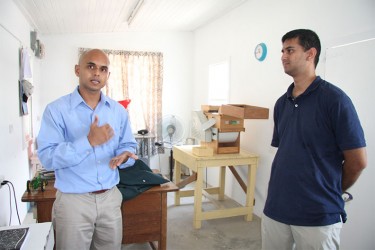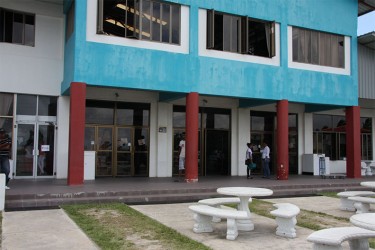Aadil Baksh belongs to the third generation of the family that migrated from the Essequibo island of Wakenaam more than sixty years ago to Plantation Affiance where, today, the business complex known as Imam Bacchus and Sons extends over 300 acres of what used to be a sugar estate.
The founder of one of the biggest, most visible businesses on the Essequibo Coast, Imam Bacchus’s first investment at Affiance was in rice. He bought a rice mill from a British businessman named Mr. Seymour. The company remains in the rice business to this day but has since expanded its operations to embrace a host of other sectors including light manufacturing, wholesale and retail food distribution, poultry production, rice, vegetable and cattle farming.
These days the company runs the Bacchus Nursery and Primary School at Affiance and also serves as a distributor for the John Deere brand of agricultural machinery.
The company is run by a Board of Directors comprising close family members. The Board is chaired by Samad and Adam Bacchus,

sons of the founder. The day-to-day operations of the company are in the hands of Aadil Baksh, a grandson of the founder and a United States-trained architect.
Like so many other businesses on the Essequibo Coast, Imam Bacchus and Sons is a part of the rice sector. They are relatively modest cultivators though every year they purchase large amounts of paddy from rice farmers on the Essequibo coast. That rice is milled and traded by the company itself. It is sold in their Affiance supermarkets and in retail stores across the country. It is an arrangement that suits the farmers since payments for paddy are made on the spot and what the company pays for paddy is based on prevailing prices.
On the day that we visited the company’s business complex, Aadil was preparing a meal for his administrative staff of about ten employees. Communal cooking and eating has become a sort of human resources tool within the company. Aadil says that it has served as a means of enhancing cohesion amongst the more than 200 employees, a number that increases at the start of the rice crop and the poultry plucking season when extra hands are required.
The chicken farm could have up to 300,000 birds. It appears to be one of the company’s biggest operations. Every week, 32,000 birds are slaughtered and sold to businesses on the Essequibo Coast. There are also important markets in hinterland communities where sales to miners account for at least half of what they produce. Aadil says that up until now falling gold prices has had no negative impact on the company’s interior chicken sales.
The company has learnt over the years to ensure that each aspect of its operations complements the others. Essequibo may be ‘rice country’ but Imam Bacchus and Sons understands the vagaries of the sector and seeks to ensure that each sector can hold its own. As rice millers, for example, the company markets its own rice.
That removes the complexity and what, these days, has become the rising anxiety levels associated with securing adequate rice markets.
The building complex housing a supermarket, a furniture store, a clothing store, a hardware store and a cafeteria is almost certainly one of the largest complexes of its kind on the Essequibo Coast. The same complex offers a Western Union Money Transfer service. There is a children’s fun park opposite the Complex.
Much of the commerce in Affiance and neighbouring communities appears to revolve around the Imam Bacchus complex. The cafeteria has become a popular weekend haunt, particularly for Friday shoppers returning from the municipal market at Anna Regina.
There used to be a time –perhaps thirty years ago – when the company used to be a much bigger player in the Essequibo cattle industry. These days the herd is considerably reduced. Imam Baksh, the older brother of Aadil and the company’s de facto Public Relations Officer told Stabroek Business that two cows are slaughtered every week and the meat sold in the Supermarket. Chowmein and vermicelli manufactured under the brand name Iman is popular on the Essequibo coast and is also sold in Georgetown.
The Essequibo economy is not one that businesses can afford to take for granted. The PetroCaribe Agreement between Guyana and Venezuela may have given an added impetus to the local rice industry but these days particularly, Essequibo rice farmers have become acutely aware of the challenges of the sector. Increased production is one thing; finding rice markets beyond Venezuela is another.

Aadil Baksh says that as suppliers of several commodities in a rice-growing community the company has a keen sense of the fluctuating fortunes of the sector. He says that the liquidity of the farmers is reflected in the extent of the patronage of his own business by the farming families, so that you do not have to be ‘in rice’ to be affected by what happens in the industry.
How to protect businesses from crime is one of the major preoccupations of the Guyana business community and for Imam Bacchus and Sons it is no different. Imam told Stabroek Business that between 1994 and 1998 the company suffered three robberies. These days, he says, there appears to have been a reduction in crime in that particular part of the Essequibo Coast. At the same time upgraded security has become an important investment.
Part of the complex houses a cricket ground. Sport is being used by the company as a vehicle for community integration. The company is currently sponsoring inter-secondary school cricket on the Essequibo Coast. They are contemplating taking their sponsorship up to the Under 19 level perhaps in the hope of turning out talent for the national team and perhaps even the West Indies team.
A cautious and undemonstrative Aadil says that business “has been good” to the company though there is never a question of taking the good time for granted. He believes that while shrewd business practices are critical to business success, securing and retaining patronage is equally critical, That is why, since moving to Affiance more than half a century ago Imam Bacchus and Sons has worked so hard to ‘belong’ to the community.




